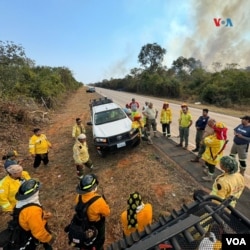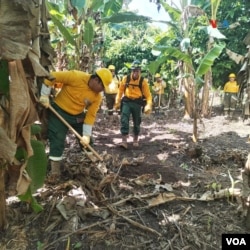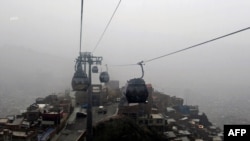Firefighters, volunteers and community members were visibly moved to welcome the rain in Bolivia last weekend as efforts continued to put out the fire that has devastated parts of the Bolivian Amazon. Although several sections of the blaze were extinguished, the situation is not yet under control.
On August 12, for example, Bolivian Air Force planes completed a cloud bombardment with silver iodide to provoke rain and thus help calm the storms. forest fires that were affecting the east of the country. According to the authorities in this area the air is highly polluted.
Since at least July, several regions of the country have been burning relentlessly due to forest fires that have so far destroyed some 4 million hectares, although environmentalists believe the damage is much greater and the consequences will be irreversible.
“This is not a Bolivian problem, it is a global problem; the Bolivian Amazon, the Brazilian Amazon and part of northern Argentina, are said to be the lungs of the world. Well, the lungs of the world literally burned. This ecological disaster will have global consequences, without a doubt,” he told the newspaper. Voice of America Enrique Bruno, commander of the Fundasol Fire Group of the department of Santa Cruz.
On September 7, the government of President Luis Arce declared a “national emergency” to channel international aid more effectively. The cabinet of ministers then moved to the region to coordinate actions on the ground.
Arce has defended his management since the fire broke out. In a recent message to Bolivians, he said: “This is a time for work and action, not the time to politicize the fight against fires.”
In the same message, he said that the fires should not be used for electoral purposes, arguing that the call for marches and blockades against his administration would threaten “the economy and the life of the Bolivian people.”
Arce responded in response to criticism from legislators, environmental organizations, private sectors and even former President Evo Morales, a former ally who has accused him of not “making every effort” to put out the fires.
“Recurring” environmental crisis
Political leaders warn that the current environmental crisis is not only Arce’s responsibility, but that it is a problem that was once also in Morales’ court.
“This is recurrent and every year it catches the government in its underwear [sin planes] “And then they declare a disaster and an emergency to seek international cooperation in the face of the terrifying environmental destruction,” Jorge Quiroga, former president of Bolivia, told reporters last Saturday.
Read also: Bolivia suspends in-person classes in regions neighboring Brazil due to fires in the Amazon
Quiroga, who led Bolivia between 2001 and 2002, called Arce and Morales “ecocidal” and of holding positions he described as “cynical.”
“These two gentlemen, who now, in their fight for the MAS acronym [Movimiento al Socialismo] They leave the country overwhelmed, without diesel or gasoline, without dollars and now without forests,” Quiroga said recently.
A recent study warned that around 34 indigenous communities and 45 indigenous territories were affected by the fires. Community leaders believe that this will accelerate the extinction of indigenous peoples.
What are the so-called “incendiary laws”?
Since 2013, during the government of Evo Morales, regulations for the expansion of the agricultural frontier came into force, which, according to the vision of the MAS, the ruling party, would help to “guarantee food sovereignty.” However, environmentalists warned that it would lead to a proliferation of forest fires.
These provisions, described by critics as “incendiary laws,” have been rejected by environmentalists, who explain that, for example, Law 337 promoted the regularization of forest lands by issuing approvals for clearings that were carried out up to 2011 and were not authorized.
Law 502, on the other hand, increased deforestation in the regions, since according to its data, between 2015 and 2023, 460,000 hectares of forest were cleared, and of these, only 40,800 were for food crops. Law 741 authorized small and medium-sized landowners to clear up to 20 hectares for agricultural and livestock activities, which were also used for land trafficking.
Law 1171, for its part, grants forgiveness for fines for unauthorized burning.
Added to this package of laws is Supreme Decree 3973, which authorizes clearing in the departments of Santa Cruz and Beni and establishes the lowest fine in Latin America for deforestation, equivalent to 20 cents per hectare affected.
In an interview with the VOA, Activist and leader of the Ríos de Pie movement, Jhanisse Vaca Daza, said that an “ecocide” is currently underway in Bolivia.
“The government has a direct responsibility not only for omission but for action and intentionality,” he explained. “Since these laws were approved, they not only expanded the number of hectares but also established pardons with minimal fines, but they also encouraged burning as a way of clearing the land during the time of the “slash and burn”, in allusion to an ancestral practice in Bolivia to prepare the land for planting or raising livestock.
Furthermore, although large-scale fires have been around for a long time, 2024 has been “the worst year” since these incidents began to be reported. In turn, the activist considered that the government’s capacity and prevention plans “have not evolved” since then.
Under pressure, the Senate last week approved the repeal of laws 1171 and 337, which will now be discussed in the Chamber of Deputies. If no comments are submitted, the Executive will leave them without effect.
The Minister of the Environment, Alan Lisperguer, in an interview with radio The Duty, He said that the repeal or abrogation of these regulations is a “responsibility of the Legislature.” He also emphasized the efforts that the government is making to address the problem, such as the issuance of the “environmental pause” decree that prohibits all burning activities.
Morales, for his part, has justified the approval of the “incendiary laws” during his government, arguing that “they were intended to support small producers.” However, he admitted that now “the rules can be revised.”
Some legislators are fuelling the debate by arguing that the repeal of these laws will also affect the country’s livestock sector.
There are at least a dozen laws and decrees that favor burning in Bolivian territories, which is why organizations defending natural resources, activists and civil society are leading actions to have them repealed.
More than 130 organizations backed an open letter on Monday on the climate emergency caused by forest fires, addressed to the Executive, Legislative and Judicial branches.
Precariousness and help
Heartbreaking images have been circulating on social media in recent days, showing the devastation in Bolivia caused by the fire. Entire communities have been evacuated, animals have been burned, children cannot breathe, skies are covered in smoke and firefighters, volunteers and residents are working tirelessly.
Although greater aid was activated since the declaration of a national emergency to deal with the fires and especially to coordinate the arrival of firefighters from other countries, activists and firefighter groups agree that it was a late action.
The national government has assured that it is not sparing resources and that it is receiving all the requested international aid. But the firefighters warn that they do not have the optimal conditions to put out the fire, help the families and rescue animals.
“We continue to put out fires like we did 40 years ago. Our technology is a fire bat, a branch, water backpacks and not even adequate clothing. I feel very bad talking about this, but more modern equipment is needed,” he told the newspaper. VOA the experienced Fire Commander Enrique Bruno.
Several solidarity campaigns have been launched and aid is reaching different regions where firefighting efforts continue. The Quebracho Volunteer Firefighters of Santa Cruz, one of the most active groups that has been working tirelessly for months, is now mobilized to buy a truck that will allow them to reach the most remote places in the protected areas.
Although the rain helped in the efforts to fight the fires, firefighters stress that there is still much work to be done as there are several active hot spots and affected families who need a lot of help.
Air quality, which in recent weeks had been reported as average to extremely poor in cities, has begun to improve. But the use of face masks and avoiding outdoor activities is still recommended.
Connect with the Voice of America! Subscribe to our channels YouTube, WhatsApp and to newsletter. Turn on notifications and follow us on Facebook, X and Instagram.







![[Img #74675]](https://thelatestnews.world/wp-content/uploads/2024/12/They-discover-a-new-class-of-X-ray-sources-in-the-150x150.jpg)









Add Comment